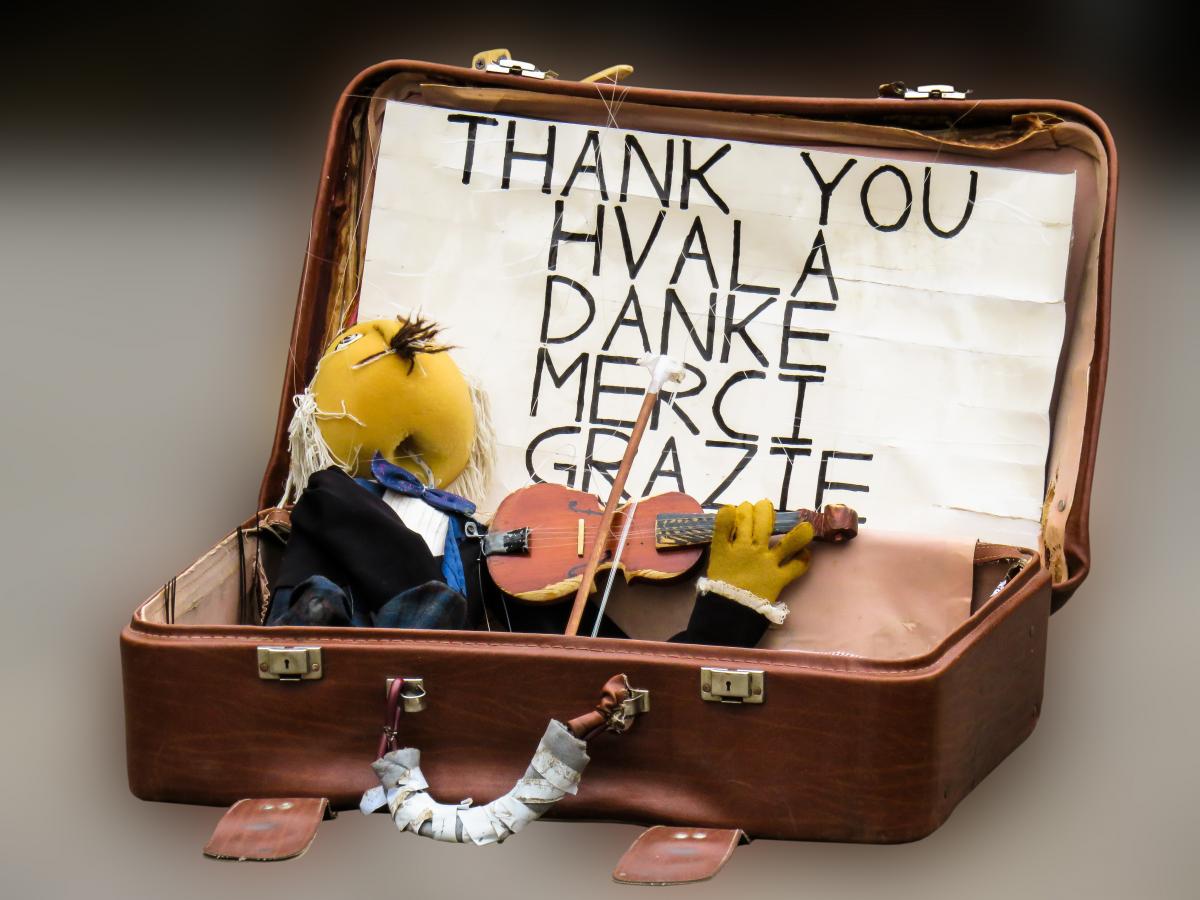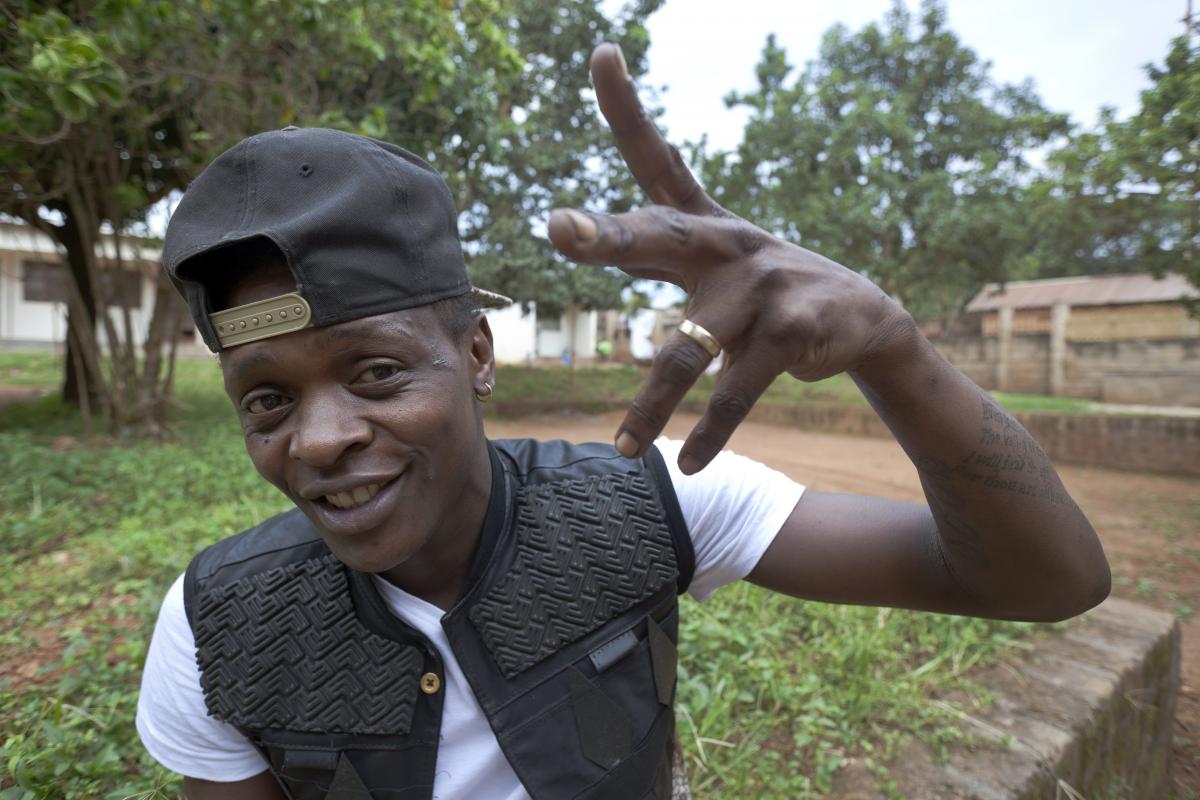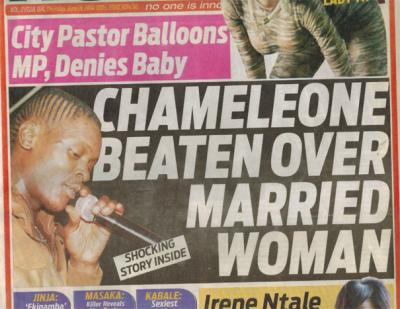Jose Chameleone is one of the most successful musicians in Uganda. He tours throughout Africa and has fans worldwide. I meet him, his wife and children in a studio in Kampala. He talks about bad media coverage (he often is confronted with), the two most magic moments in his career, his brand endorsement with Pepsi, music as a form of therapy, and about how African music markets are growing stronger than ever before.
[Thomas Burkhalter]: How would you introduce yourself?
[Joseph Chameleone]: My name is Joseph Chameleone Mayanja, aka Jose Chameleone, the doctor. I am a musician all the way, from East Africa, representing Uganda and Africa worldwide. Yeah, I’ve been doing music for like 14 years now. If you ask anybody around the world that is interested in urban African music, they’ll definitely know who I am.
[TB]: When you wake up in Kampala, what do you hear?
[JC]: I wake to the songs of birds. And often, I have a song in my head, not necessarily one of mine, but for example one by Radio & Weasel. My life is entirely music.
[TB]: Why is music so important?
[JC]: I usually create music when I feel down, when I’m lonely, when I need music to support me. That is my drive.
[TB]: How do you deal with the business side of your career? As a star singer music might not be about emotions only anymore.
[JC]: I’ve never looked at the commercial side of music. I’ve just been fortunate that my music has paid me. You have to remember that I’m from a community where opportunity is very scarce. 85% of the people in my community need a voice like mine. They are under emotional oppression. These people understand what I go through. I want to be recognized as a voice that spoke for them when they had nobody to talk to. So, with my music, I look at the majority.
[TB]: In Europe, it becomes more and more difficult to earn money with music. How is the situation in African countries?
[JC]: In Europe the music market is older than in Africa. In Europe too digitalization is stronger. When I’m in Europe, I play songs on YouTube, I don’t download them from iTunes – because you guys have fast Internet. In Africa, people still buy CDs and listen to them at home. Music is therapy, music is comfort, music is something people fall back to. I had a very big concert back in March, it was called «Tubonge Live». I played in front of 45’000 people who came to trash their stress there. They need music to rejuvenate, to be happy again. I mean 85% people here need music therapy. In Europe I don’t know the percentages, but maybe 15% need therapy. That’s the difference.
[TB]: Would it be different if you lived in London, and not in Kampala? Is it better to stay here, or did you ever plan of leaving?
[JC]: Let me tell you one thing: Africa is the next destination. The times when artists left Africa and went to Europe are mostly over. Back then we had no studios here. Now, we have everything in Africa. How are you going to represent Africa, if you live in Europe? You go there for a tour, or to record a song, but here is were we belong. Look how Afrobeats are capturing Europe and the rest of the world right now. The world has listened to salsa, reggae, hip-hop. Now the world starts to explore Afrobeats and Afropop.
[TB]: There are changes indeed. Urban African styles like Kuduro, Azonto, Shangaan Electro, Kwaito are being played in clubs in Europe.
[JC]: Our music is growing, you see? Technology is helping us a lot to improve the quality of our productions. I don’t need to go to Jamaica to produce a reggae song anymore. I don’t need to go to the US to record a hip-hop track. I can do it a home. Artists here are hungry too: Nobody has had a chance. Now we are getting somewhere, bit by bit.
[TB]: If you look at your market where does your income come from? Can you make like a list?
[JC]: I make most money from endorsements and performances. Presently I’m the brand ambassador for Pepsi. I also try to re-invest as a person. I do a lot of real estate property. That’s how it works.
[TB]: On the other hand, a lot of people earn from your work.
[JC]: Yeah, here in Africa a lot of people survive on the music that I do. I mean from the producers to my entourage, the people who prepare my concerts. The list is endless. Everybody has a job, and everybody gets paid. I’m glad that I can actually create opportunity for many people.
[TB]: When you started fourteen years ago, was international success already one of your goals?
[JC]: No. Music was just a passion. I used to sing at home. My father played the trombone in a brass band, and my grandfather played the guitar at home. As a little kid I was watching «Top of the Pops» on TV and I wanted to stand on this stage too, in the disco light. Eventually, one of my songs broke through. People loved it and demanded for the next one, then the next one, and the next one. I became trapped into professional music.
[TB]: Media seems rather aggressive here in Uganda. Yesterday, I read a front story about you being beaten up by a jealous husband. And I keep reading about Ugandan musicians fighting each other. What is this all about? Is it maybe a little promotion trick to steer attention?
[JC]: No, it isn’t.
[TB]: So, how does it work?
[JC]: Music business in Africa is still unprofessional. We have unprofessional players, and unprofessional counterparts. I saw this story that you are telling me about. It doesn’t make sense, and it is not even true. They have to write it, because Chameleone is a big asset to them. See, you have an Art and Design student at «Makerere University». When he drops out he looks for every opportunity that is there. He has a brother in the media, and he becomes a journalist, because he can hold a pen and write English. And yes, these fights you talk about: For people to understand each other, they have to disagree first. People disagree to agree. As I told you, African music is growing. At a certain point, dust will settle and things will become professional. People here have not looked at music as a profession, but as competition – especially upcoming artists think that Chameleone has been around for many years, and they feel that I am sitting on their seat. This can spark up a fight.
[TB]: Do these media articles disturb you?
[JC]: Initially these articles used to bother me a lot. I’ve asked people to stop them, and they have refused to do that. Today, the only thing that bothers me a lot is that I am a father. My children can read. I have to explain to them what happened so that they understand the life I live. When I see in the morning that a newspaper has written something that won’t please my family, I make sure that I occupy them the whole day, so they don’t have a chance to read it. I’ve worked so hard for my life, and I should be enjoying this just like any other person that has achieved something. But unfortunately, I’m enjoying with a lot of loopholes.
[TB]: Is anger an important emotion for you?
[JC]: No, it’s more disappointment. «Badilisha» for example, one of my popular tracks, is a total emotional portrait. I have a wife, I have children, but I’m always on the road. Sometimes I imagine how they have managed to understand my lifestyle. My sons need their father to be around, my wife needs her husband to be around. But unfortunately she is used to living without me. So, in my mind, I imagined that one day she wakes up and says: «Joseph I love you so much, but I can’t be with you anymore, simply because your job cannot support me emotionally.» So, I live with this constant disappointment that I can’t have ample time for my family, and yet my music supports my family. This creates a lot of questions that I capitalize on in my songs.
[TB]: Your kids and wife are here in this studio, and I see that you are very nice with them. To which extent are your kids an inspiration for your music?
[JC]: They are a great inspiration. Children have honest opinions, and honest minds. Usually, my children are the first to hear my new recordings. I play my new songs at home, without saying anything. And when I’m lucky, one would ask «Baba, is that a new song?». And I’ll be like, «Yeah, what?» Then I wait to hear their opinion. I mean, when I ask friends, some won’t tell me the truth. They are like «Yeah, yeah that’s hot and blah, blah», but they won’t mean it. But if a little child tells you that a song is good, then something has to be good about it.
[TB]: When you look back on your career, what would be the most magic moment?
[JC]: The most magic moment was when I performed for the president of the Republic of Rwanda. I was performing in the stadium, and he stood up and started dancing. And then he asked the security to bring me up. It was big, not because he was president, but because he is a principled president. He hugged me and said, «I love your music». He was all smiles, and that picture became very big. People rarely see him laugh or smile. And maybe the second magic moment was, when I took my mother to Congo. I was invited for a big performance. When we landed, the airport was full of people. People were running after my car, and my mother started crying. I was once a baby that she pampered, and here she suddenly saw the impact I have on many people. It was very memorable.
[TB]: Is it important for you to feel accepted, by an official politician, by your mother and family?
[JC]: Yeah, it is a big credit. I started singing in my own room, and my big brother used to tell me, «Don’t make noise, I want to sleep.» Later, my brother became my first fan. Then my neighbor became the second fan. It’s unbelievable how people sum up and now reach up to a million fans. To be honest with you, I feel very blessed. I want to be relevant to my society, because it’s my society that is lifting me up.
[TB]: What are most important topics you work upon, and what are topics that you would never touch?
[JC]: I would never work for politics, because I don’t understand it. I want to talk about things that I can elaborate upon. The things I tackle most happen in my society. The violence against women is something I’ve sang in a song called, «Jamilla». It was against violence against women. I have come up with lots of songs. I’ve talked about marriage, relationships, children, birth, a lot of things. Like I told you, I want to be remembered. I don’t want to sing about something that is going to vanish. I’m not going to sing about Range Rovers because twenty years from now there might be no Range Rovers anymore. Listen to Bob Marley’s music for example, even today when you listen to it, it still makes sense.
[TB]: In many African videos you see big and expensive cars, big watches, sexy women. Why is that?
[JC]: That’s what people want to see. People want a smile on their face. There are certain things we do for trend too. I mean you’re not going to stay behind and do cultural videos while people want to see the big cars. So, sometimes the market also influences what we do.
[TB]: To which extent are your stories local? And to which extent can they be translated to international audiences?
[JC]: When you sing from the heart, every heart will understand it. You can tell a sad note from a happy note. I was successful allover Africa, and I’ve been nominated for the World Music Awards, and for the MTV Europe Awards for Best African Artist. It didn’t matter whether I was singing in English or Swahili. However, as the world goes, I am also starting to brand and package myself in a way that everybody understands what I sing about.
[TB]: Is Europe still an important market for you? – In Europe we still sometimes believe that musicians from allover the world look towards us and want to perform here. But I’m not sure if we are wrong?
[JC]: No, Europe is still an important market, because that is the heart of the world. Let’s be very honest. I mean the best sound engineers are in Europe. We in Africa have resources, we can sing for example. When I do my shows in Uganda, the sound is different from shows in Europe, because those folks in Europe are very good with sound. Professionalism in Europe and Africa are not the same. But, as I said before, we are growing to professionalism. So, if in the future we can fuse Europe to Africa, we are ready to go. What is taking African music to Europe is fusion too. Before, we used to sing songs with 70 to 100 beats per minutes (BPM). Now we are doing music with 120 BPM. That’s fusion. 120 BPM belongs to the Europeans. This chemistry seems to work.



